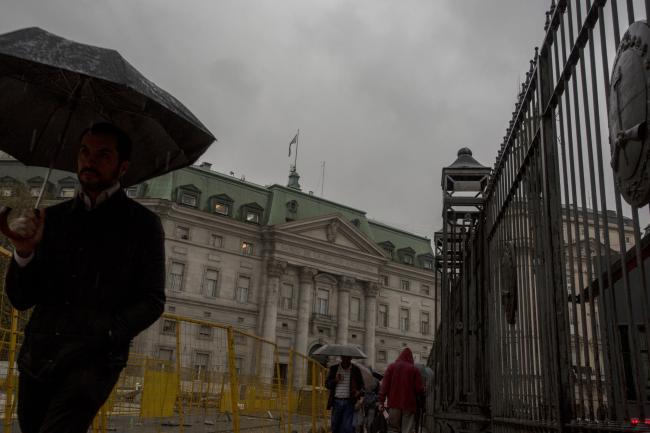(Bloomberg) -- Argentina took emergency steps to stabilize its currency in the wake of an emerging-market rout caused by Turkey’s crisis, jacking up its key interest rate by 5 percentage points to the highest in the world and outlining a plan to eliminate short-term notes.
Policy makers set the rate for seven-day notes at a record 45 percent and pledged to keep it at that level at least until October. The central bank will phase out 1 billion pesos ($33.2 billion) of short-term notes by December, and said it would sell $500 million at an auction Tuesday to relieve pressure on the peso.
Argentina’s dramatic moves are in contrast to what’s happening in Turkey, where President Recep Tayyip Erdogan’s government has lost the confidence of investors by refusing to raise interest rates in the wake of the crisis. While Argentina suffers from some of the same economic problems -- fast inflation and sizable current-account and budget deficits -- the Latin American country’s policy makers are reacting with orthodox policies blessed by advisers by the International Monetary Fund.
“The central bank is showing determination to prevent an overshooting of the the currency and inflation,” said Alberto Ramos, the head of Latin America research at Goldman Sachs (NYSE:GS). “An external shock has hit the currency and they’re reacting in the classic way -- what you need to do is hike rates and hope to be able to stabilize the currency with that.”
The peso recovered from its lows of the day after the rate announcement. It was down 2.4 percent to 29.98 per dollar on Monday afternoon after falling as much as 3.6 percent. It was the fourth surprise rate hike by the central bank this year as officials try to combat a currency selloff spurred by concern inflation was out of control and the government wasn’t taking sufficient steps to shore up the economy. Argentina’s peso has tumbled 38 percent this year and the yield on its century bonds has soared past 10 percent.
But the most recent selloff in the peso --the more-than 6 percent drop of the past two days -- was spurred by concerns Turkey’s problems would infect other emerging markets. Argentina was seen as among the most vulnerable economies.
“They had to do something against contagion,” said Siobhan Morden, the head of Latin America fixed income at Nomura Holdings. “You have to do what you can to minimize financial contagion to the real economy.”
Monday’s announcement came the same day the IMF began its mission to Argentina after granting a $50 billion credit line to the South American nation in June. That was the same month former Finance minister Luis Caputo took over at the central bank from Federico Sturzenegger, who admitted he had lost credibility with investors as he resigned.
The Treasury Ministry separately announced Monday that it instructed the central bank to immediately cancel its daily dollar auction. It had been selling between $50 million and $100 million a day since June 21 to defend the peso. In its statement, the central bank reserved the right to sell its reserves as it sees fit.
